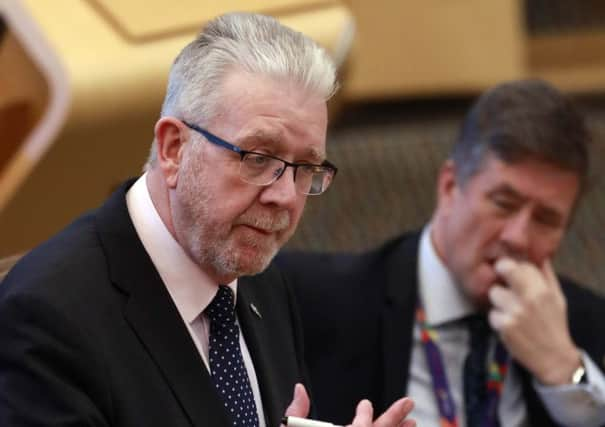7 questions surrounding the SNP's alternative Brexit bill


We look at what happens now as the UK enters uncharted waters.
Q What is the Continuity Bill?
A The Scottish Government’s Continuity Bill would assert Holyrood’s control over 111 powers in devolved areas like agriculture, the environment and public procurement that are currently managed by the EU. The bill would roll over current EU regulations in those areas into Scottish law.
Q Why is it so controversial?
Advertisement
Hide AdAdvertisement
Hide AdA The UK Government says that some of those powers could have a direct impact on trade within the UK, and the UK’s ability to sign trade deals with other countries, if there was any divergence between England and the devolved nations. For instance, changes to the regimes on food labelling or animal health could cause serious problems for companies moving goods from one part of the country to another. Ministers in London want to have the final say on around 25 of the most important powers to ensure a ‘pause’ on any changes to existing rules until they can agree a ‘joint framework’ with Edinburgh and Cardiff to make decisions together. The Scottish and Welsh governments say they want to take part in joint frameworks, but insist that any restrictions on the disputed powers would undermine devolution.
Q Does the Scottish Government have the authority to take control of the disputed powers?
A At Holyrood, there’s some disagreement on this. The Presiding Officer of the Scottish Parliament says that MSPs can’t legislate to take control of powers that fall under existing EU treaties, but the Lord Advocate has advised the Scottish Government that because EU law will cease to apply from Brexit day, anything that takes effect after that point is within the competence of Holyrood. Scottish Ministers are free to push ahead with the Continuity Bill, though. In Cardiff, the Presiding Office of the Welsh Assembly has reached a different conclusion, saying a similar Continuity Bill is within competence.
Q What is being done to sort this out?
A The UK, Scottish and Welsh governments have been in talks for about a year to try and get an agreement on amendments to the EU Withdrawal Bill, which is the piece of Westminster legislation that will transfer EU law into UK statute, and which sets out how the 111 powers will be dealt with. Despite saying they have made progress, no deal has been reached yet. The UK Government says it has made a “considerable offer” in promising to amend the Withdrawal Bill to ensure more than 80 powers go directly to the devolved administrations.
Q What happens if there isn’t a deal?
A The Withdrawal Bill is currently before the House of Lords, and the UK Government has until 12 March to table amendments, so an agreement needs to be reached by then. The Scottish and Welsh parliaments will get a vote on whether they consent to the legislation, and ministers in Edinburgh and Cardiff have said they will refuse consent unless the changes meet their demands.
Q So what’s next?
A After a summit last week, ministers from all sides will meet again next week, and if necessary, Nicola Sturgeon and Theresa May are scheduled to meet face-to-face in March - however, that might be too late.
Q Will this block Brexit?
A Any delay to amending or passing the Withdrawal Bill at Westminster could throw the UK Government’s whole Brexit legislative programme into disarray. Failure to get the consent for the Withdrawal Bill from the devolved administrations would be politically challenging for the UK Government, and could boost demands for a second Scottish independence referendum. Ultimately, Westminster is the UK’s sovereign parliament, as was confirmed in a Supreme Court ruling last year on whether MSPs had to be consulted before triggering Brexit, so as long as MPs agree to the final Brexit deal later this year, the UK and Scotland are leaving the EU. But we’re entering unprecedented constitutional territory, and it isn’t clear how the issue will be resolved, or if the three governments will end up back in court before Brexit day.